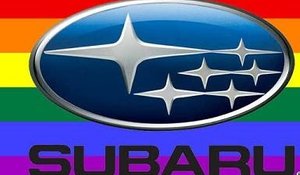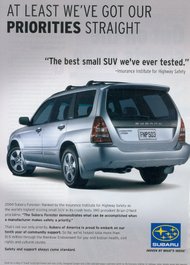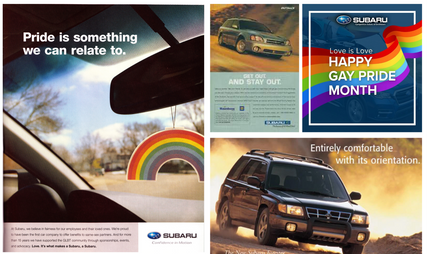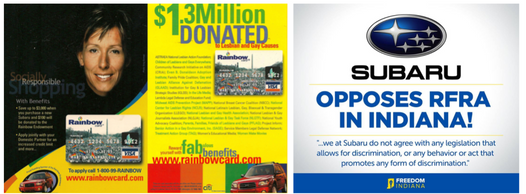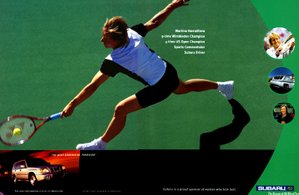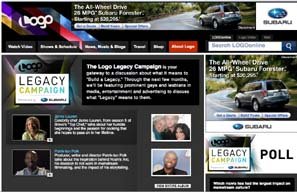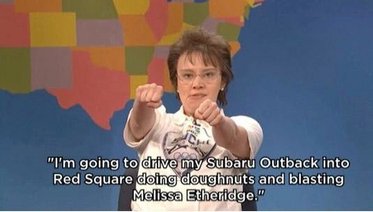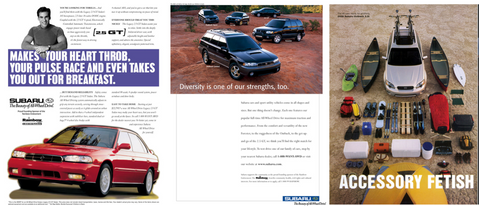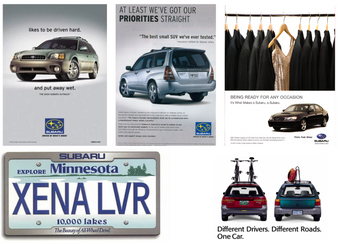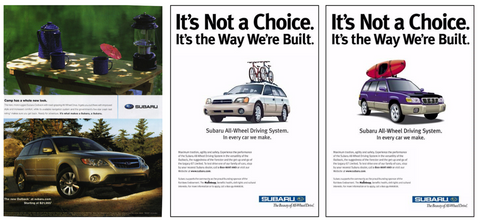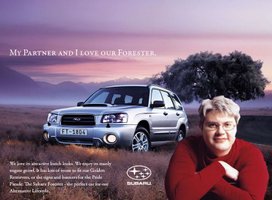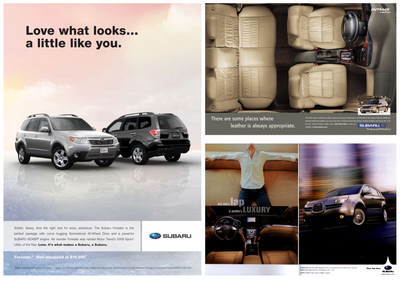© 2022 BRIGHT Marketing Solutions
Click on pictures for larger image.
Marketing the Rainbow
Subaru is the automotive division of the Japanese transportation conglomerate Subaru Corporation, formerly Fuji Heavy Industries (FHI). It is a small player, the twenty-second car manufacturer worldwide. Subaru is the Japanese name for the Pleiades star cluster "The Seven Sisters" (one of whom, according to tradition, is invisible - hence only six stars in the Subaru logo). The logo also refers to the six companies that merged to create FHI.
Fun fact: Subaru started in 1954 with the production of the Subaru 1500 with the code name P1, which was largely based on the model of the Peugeot 403, but which was discontinued after 20 units.
Subaru stands out from many of its Japanese competitors in that it still makes nearly 75% of its cars sold internationally in Japan. Subaru's main overseas manufacturing facility is located in Indiana. The United States is the main market for Subaru, where more than three times as many cars are sold as in the home market.
The core values of the brand are: Safe, Fun, Tough and since the hybrid and electric models, Power On
The beginning
In the 1990s, gay-friendly advertising was largely confined to the fashion and alcohol industries. Pop culture also had to embrace the LGBT cause. Regular movies and TV shows featuring gay characters — like Will & Grace — were still a few years in the future, and few celebrities were out. When Ellen Degeneres became a rare exception in 1997 and her character on the show Ellen came out, many companies withdrew their ads. She was then canceled for years (so was also a precursor), until she became the successor of Oprah as the most powerful media woman with her own talk show. That show lasted for 19 years, she won 34 (!) Emmys and she is now worth half a billion. Q.e.d.
Subaru was one of the first car brands and even brands in general that focused on the LGBT customer, more specifically: the "L" – and that was also very special.
Rainbow Card
In 2002, Navratilova teamed up with marketing agency Do Tell to launch the Rainbow Card. Subaru was the first sponsor, followed by British Airways.
The car brand also did not shy away from political statements, for example with the introduction of the highly controversial RFRA law in several states, which would legalize discrimination against LGBT people "on the basis of religious freedom". That law, or rather the counter-reaction that was evoked by major corporations, among others, cost the state of Indiana, where Mike Pence was governor at the time, billions of dollars (see my article “How Pence destroyed Indiana”).
Introducing: Martina Navratilova
International tennis legend Navratilova was embraced by Subaru of America after the company began courting the lesbian market in 1996. A TV campaign features Martina among other female athletes in the "What Do I Know?" theme. The spot includes golfers Juli Inkster, Meg Mallon and Olympic skier Diann Roffe-Steinrotter. Each asks, "What do I know" about performance, control, grip, etc. Martina gets the last word in, asking "What do we know? We're just girls."
Tim Bennett wanted to dispel a few notions. "Everyone assumes it's a lesbian campaign because it's her and they thought those other women were too. But Martina doesn't want to be positioned as a lesbian. She just wants automakers to speak to women in an intelligent way, something else few others do even today."
Having said that, it is remarkable how Subaru moved to the lesbian drivers more and more, with puns and wordplay that could only be construed as "targeting the L."
Subaru also realized that if they just put gay terms in their ads, people would see through their intentions in the blink of an eye as pinkwashing. They had to show that they really cared about the LGBT community - and they did. They contributed millions to HIV research and other relevant charities. They made sure to also support their queer employees and took part in Pride parades.
Specific communications
For the first ads, they hired women to portray lesbian couples. But the ads didn't get a good response from the lesbian public. What worked were winks and jokes. For example, the print ads featured Subaru models with license plates like "XEN A LVR," a joke about the show's lesbian popularity Xena, Warrior Princess, "CAMP OUT" and "P-TOWN," a reference to Provincetown, the popular tourist destination for LGBT people. The ads also appeared on billboards and bus shelters – but the average citizen didn't understand those jokes.
Celebrity success
Navratilova's iconic lesbian status was successfully used by Subaru to attract lesbian clientele. Her only regret is that it didn't happen while she was still playing*. "If I had kept quiet about it, I would have had ads a long time ago. That's a fact." In an interview with The New York Times, she said, "All most other advertisers could see was the fact that I'm a lesbian. Subaru doesn't care. They see me as all I am."
At the same time, Subaru used actor Judge Reinhold and cycling superstar Lance Armstrong to appeal to other market segments. All in all, they managed to pass Volkswagen, Mazda, BMW and Lexus in sales at the time.
They also sponsored the Showtime series The "L" Word and hosted the Subaru Annual Rainbow Leadership Awards, introduced in 1996 by Martina Navratilova, Nancy Becker and Pam Derderian, the latter also pioneers in niche and LGBT marketing. . The award "serves to meaningfully fund charities that are of interest to the LGBT community".
Public reaction
Of course, there was some negative backlash from the cavemen, homophobes, and everyone else who is on the wrong side of history. There was a grassroots campaign to send letters condemning Subaru for "promoting homosexuality". Funnily enough, some even misspelled Subaru in their letters. So in the end, who cares what they think?
But, as it turned out, it didn't affect Subaru's policies. Bennett: “Look, we know our riders and our consumers are well trained, and they celebrate diversity. A person who would have been offended by our advertising probably wouldn't have bought our car anyway."
* Martina Navratilova came out as a lesbian in the early 80s (having just changed her Czech citizenship for an American one), but only after the height of her career did she become involved in (LGBT) marketing. Even though she won more tournaments than any other player in history, male or female, most companies were afraid of being endorsed by an open lesbian. She did have brief appearances for Apple Computer, LA Eyeworks and The New York Times and pitched for Prince racquets.
Logo & Legacy
In the same year, MTV Networks' Logo and Subaru ran a six-month brand campaign that played on the notion of creating a legacy for oneself. The Logo Legacy Campaign featured 3-minute video interviews with gay and lesbian entertainers, artists and entrepreneurs, each of which will expound on how they broke into their particular field and how the notion of “legacy” informs their work.
The campaign coincided with the launch of the fifth-generation 2010 Subaru Legacy sedan. Throughout the six-month run, Logo intended to drive viewers to the Legacy site by way of heavy on-air promo rotation.
Subaru has partnered with Logo since the network launched in June 2005 with 13 million subscribers, and was one of the first marketers to create custom commercial content for the startup.
Conclusion
An early starter in Marketing the Rainbow with the particularity that it is mainly aimed at the female drivers, albeit only in the US. They have also held it up for a long time, creating the legend of Lesbaru. Original, custom-made content with lots of naughty jokes. Support for charities. The whole package: Subaru scores a 9/10.
Target group determination
How do you advertise a car that journalists describe as “solid, but boring”? That was the question Subaru America bosses faced in the 1990s. When the company's marketers looked for people willing to pay a premium for four-wheel drive, they identified four core groups that accounted for half of the company's U.S. sales: teachers and educators, healthcare professionals, IT professionals and outdoor types. And then they discovered a fifth: lesbians. "When we did the research, we found parts of the country like Northampton, Massachusetts and Portland, Oregon, where the head of the household would be a single person — and often a woman," said Tim Bennett, the company's director of marketing. When marketers spoke to these customers, they realized that these women who bought Subarus were lesbian.
But did the company want to create advertisements for LGBT customers? At the time, in the mid-1990s, a Democratic president had just passed "Don't Ask, Don't Tell" and after IKEA aired one of the first major ad campaigns depicting a gay couple, someone had a bomb threat on an IKEA. store reported.
Although it was easier to get senior management on board creating ads for hikers than for lesbians, the company went ahead with the campaign. It was such an unusual decision—and such a success—that it helped push gay and lesbian advertising from the fringe into the mainstream. People joke about lesbians' affinity with Subarus, but what is often forgotten is that Subaru actively decided to cultivate its image as a car for this target audience - and it did so at a time when few companies would embrace or embrace their gay customers. even acknowledged.
Introduction
Lesbian affinity for Subaru is a popular joke: just like wearing Birkenstocks — it's the subject of Saturday Night Live sketches and self-mockery jokes about lesbian stereotypes.
Subaru's pioneering role in rainbow advertising is famous in the marketing world, but the automaker's role in cultivating its lesbian-friendly image is less known to laymen. That's probably because so many straight people were blind to the (jokes and puns in the) ads.
Subaru is one of the few brands that has done its own research into the LGBT market, which found that lesbians love the brand. That was of course also a self-reinforcing effect! So it entered that market in 1996 and is still one of the few big companies targeting lesbians, as well as one with specific advertisements, rather than deploying mainstream imagery and videos in LGBT media.
Within Subaru of America, however, not everyone agreed with the approach. There was a somewhat negative public reaction, and marketing director Bennett says the campaign only survived because their team really cared about the project and got the support of a cohort of heterosexual allies in the company.
Radar Love
In 2003 they are a founding sponsor of Sirius OutQ, a radio station aimed at LGBT people.
In the same year there is also a video of two young guys racing down a winding road. They enjoy their vehicle together and sing along to Golden Earring's 'Radar Love'. Are they friends or more? We call this 'gay vague', and it is reminiscent of many similar advertisements from Volkswagen. However, given Subaru's reputation in "Marketing the Rainbow," these guys could well be partners.
The B9 Tribeca model was advertised with the tagline “Room for Seven. Or whatever you fancy”. Campaigns included some bold, ambiguous phrases, such as “Open bed!”, “Get all your toys!”, “Snag hooks!", "Non-Stop Action!", "Get Out. And Stay Out." “Entirely comfortable with its orientation”, “Firm grip!”, “There are some places where leather is appropriate”, and “Would you like to take a ride?” The copy also literally referenced Diversity and “It's Not a Choice . It's the Way We're Built". There was also a commercial that featured both a gay male couple and a female couple, with the lyrics "Beauty meets Power" and "Sophisticated meets Sensible".
While many LGBT consumers loved the inside jokes on the license plates, straight people didn't notice and only noticed the accessories as a "bike rack".
Gay men
While the brand is mostly associated with lesbians, a number of ads were also created to target gay men, sometimes with veiled references to sexuality: "Try Me... I'm Versatile!". One tagline even says "Nice package" - which is a gay reference and not a lesbian. Another ad described the characteristics of a one-night stand: "even takes you out for breakfast".
Bennett said the campaign was an extension of the company's niche marketing strategy, which targets groups as diverse as IT professionals, nurses and alpine skiers. "People buy and drive our cars as an extension of their lifestyle," Bennett said. "With our brand, we have a very well-educated and diverse audience, so this is a perfect fit for us."
In a 2009 survey (of 3,685 respondents) by Gaywheels.com and Sorgenfrei, Subaru was the overwhelming favorite (voted by 45% of respondents, with Volkswagen and Ford a distant second and third) as the most gay-friendly car brand. But that image alone apparently doesn't sell cars: Toyota (which had 12.8% of the total car market in 2008 and has also been an ally for years) is the brand most often owned by the people who took part in the survey.
The picture on the left was a parody, made on the waves of L-marketing
Faster than Tesla?
Subaru's love affair with the LGBT community didn't end in the 1990s. Not only have they embraced the "Lesbaru" stereotype in pop culture, they're continuing their outreach efforts — and it's worked. Subaru is consistently named as the favorite car brand of many queer consumers. When the 2007 recession hit, Subaru was the only auto company not to lose stock, and in the 2010s Subaru grew faster than any other auto brand… except Tesla.
In 2020, Tesla and Subaru were the leaders in brand loyalty in an Experian analysis of US car registrations.
GLAAD
In this video we see Jenn Hofman, who founded an orphanage (Nomad Charities) in Kenia with her twin sister Jeanette. For the 1st GLAAD Awards in Advertising it was nominated for Outstanding TV commercial – LGBT Market.
GLAAD also announced that Subaru would receive the Corporate Responsibility Award for its long-standing and public commitment to the LGBT consumer.
Case study: Subaru
Branche: Cars
